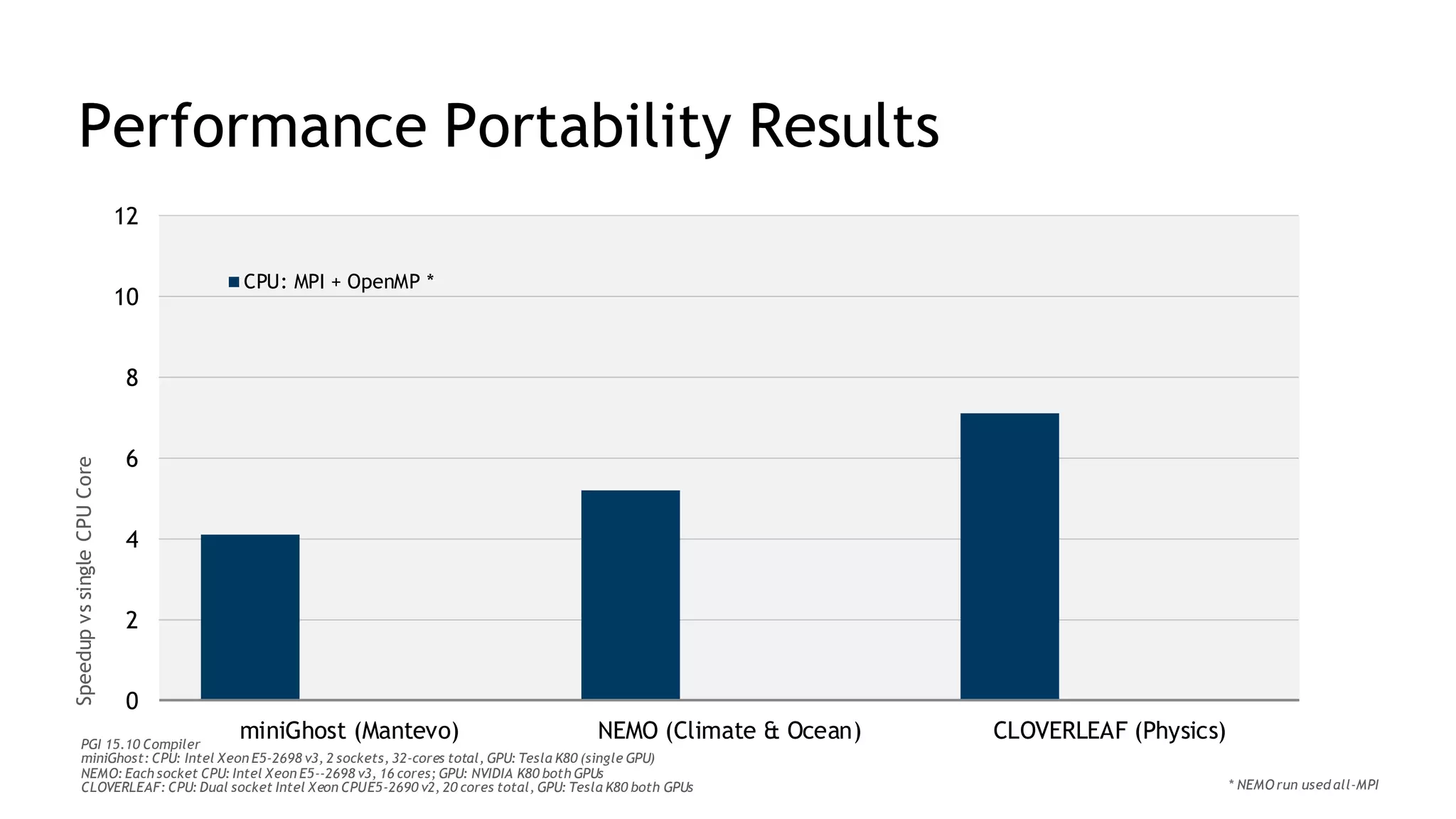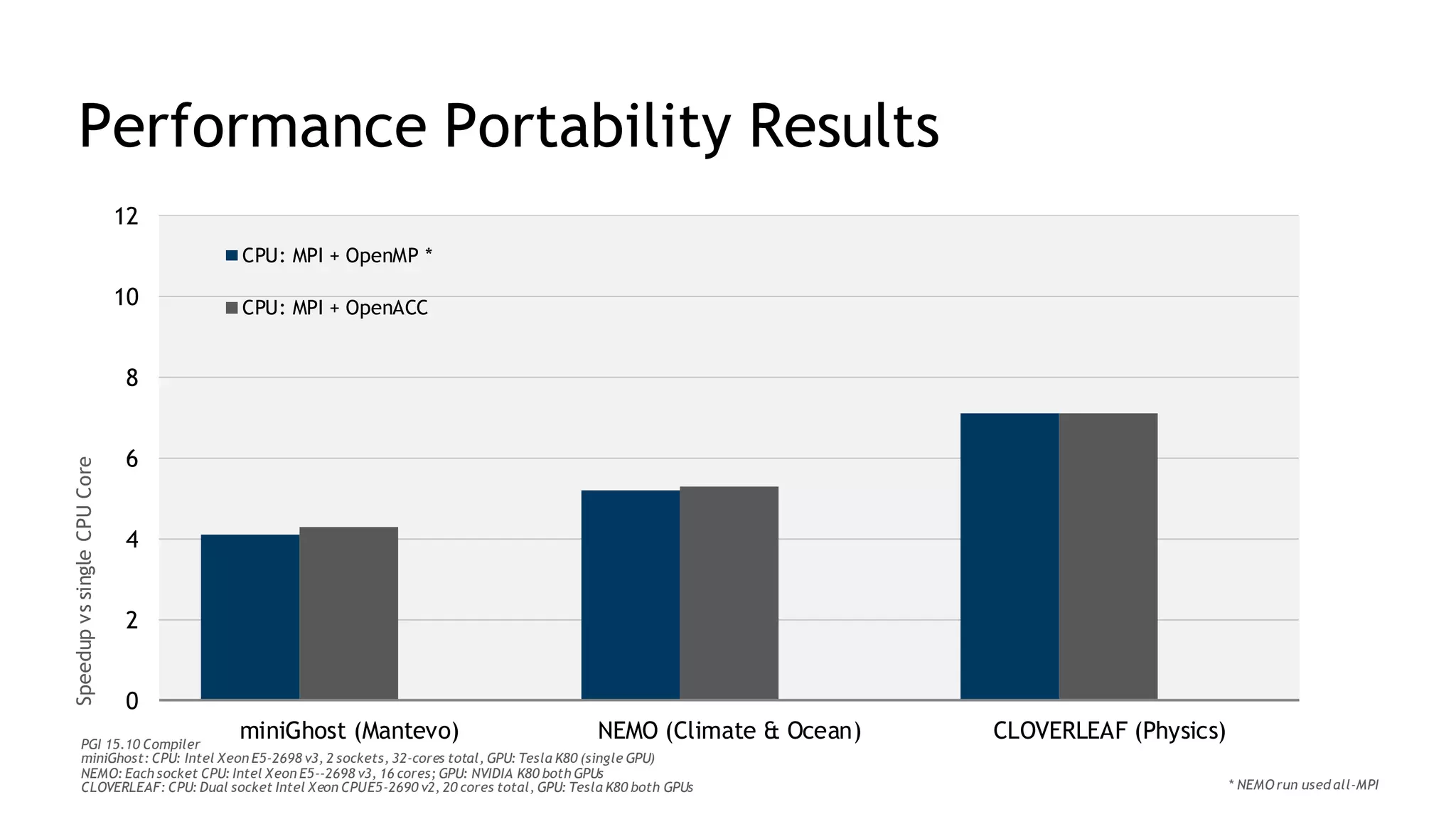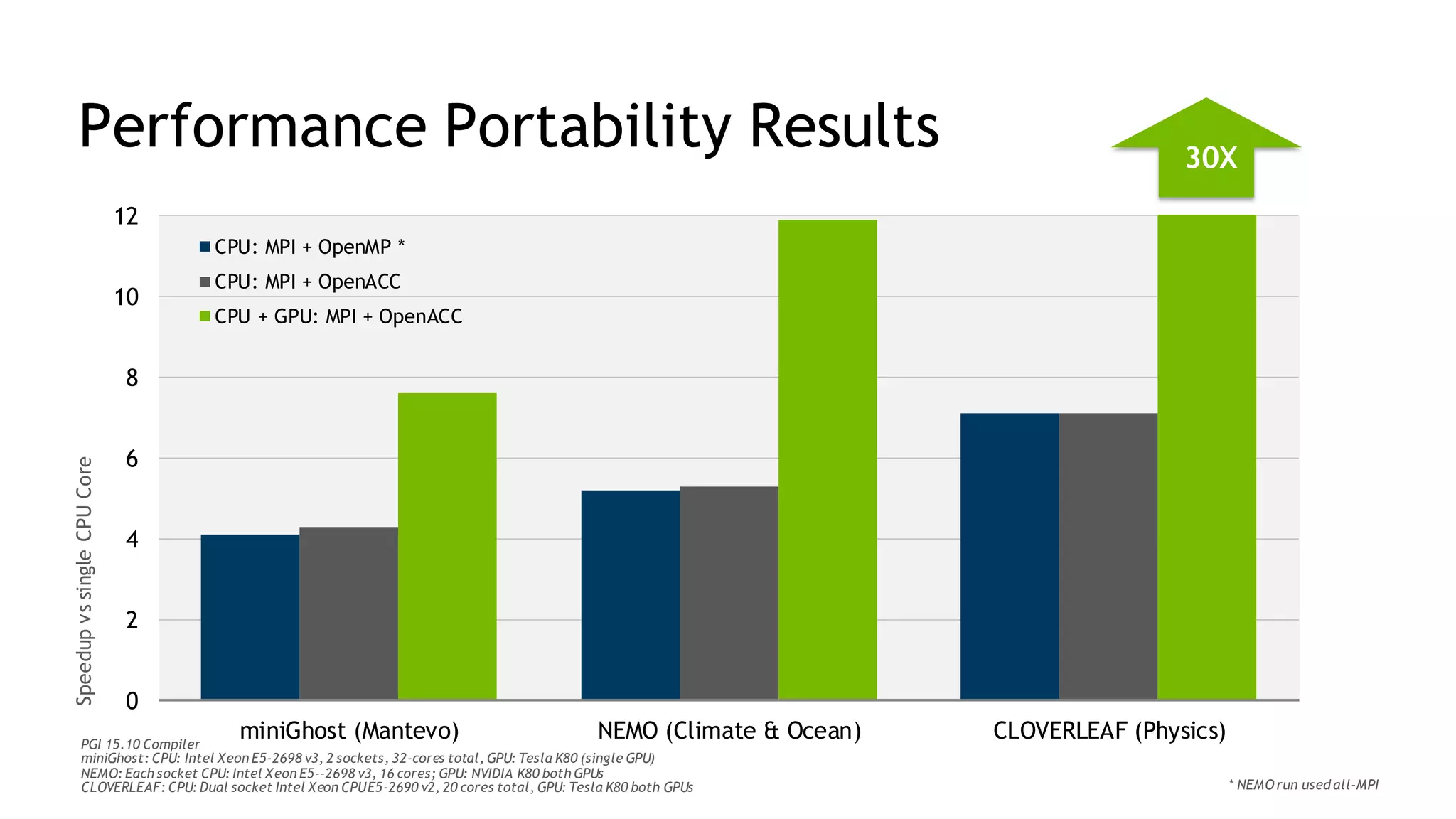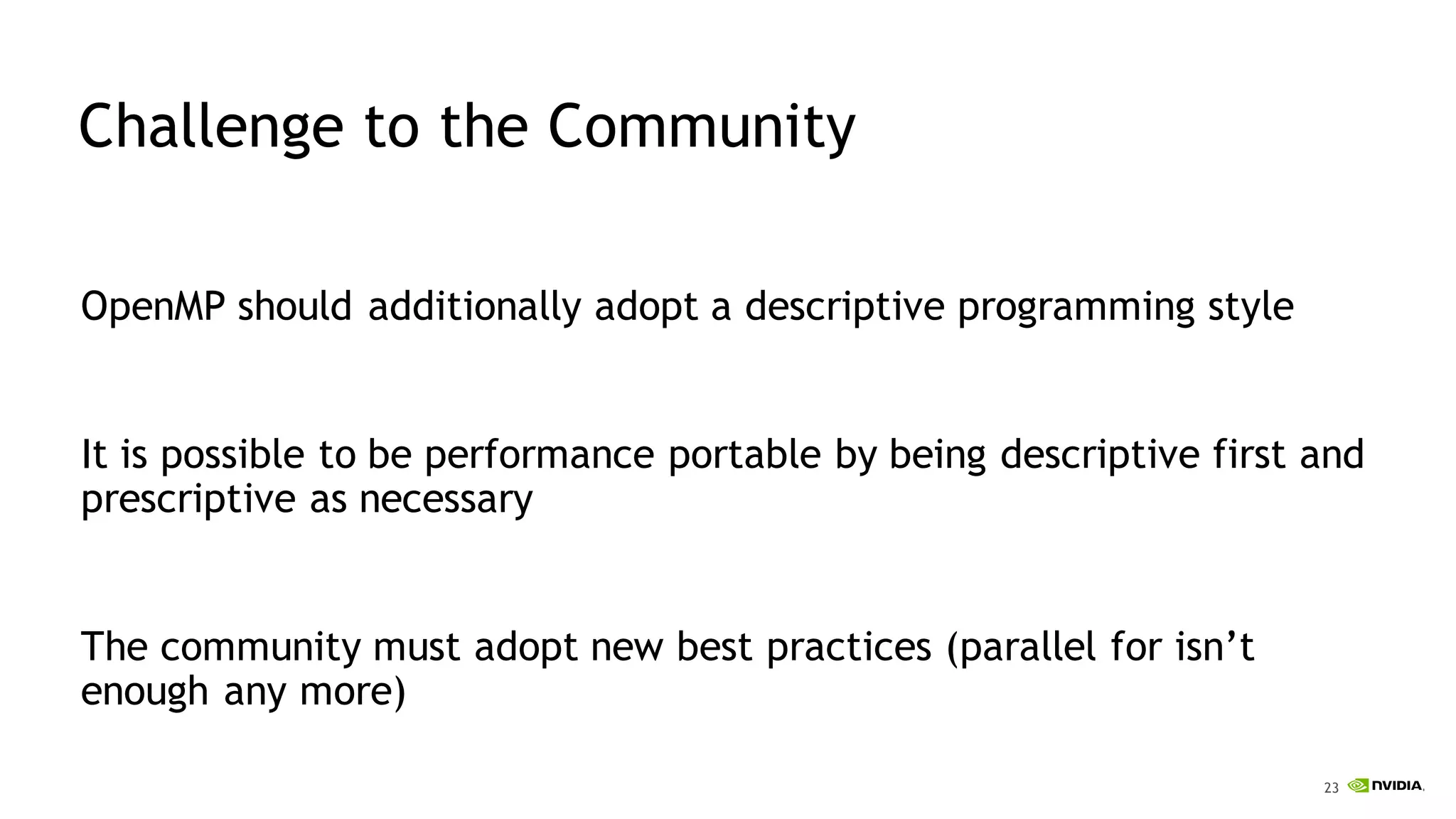The document discusses performance portability, defined as the ability of code to run well across various architectures. It distinguishes between functional portability and performance portability, asserting that descriptive parallelism allows for performance portable code by providing explicit directives to the compiler. The author illustrates this concept through examples utilizing OpenMP and OpenACC for parallel programming.

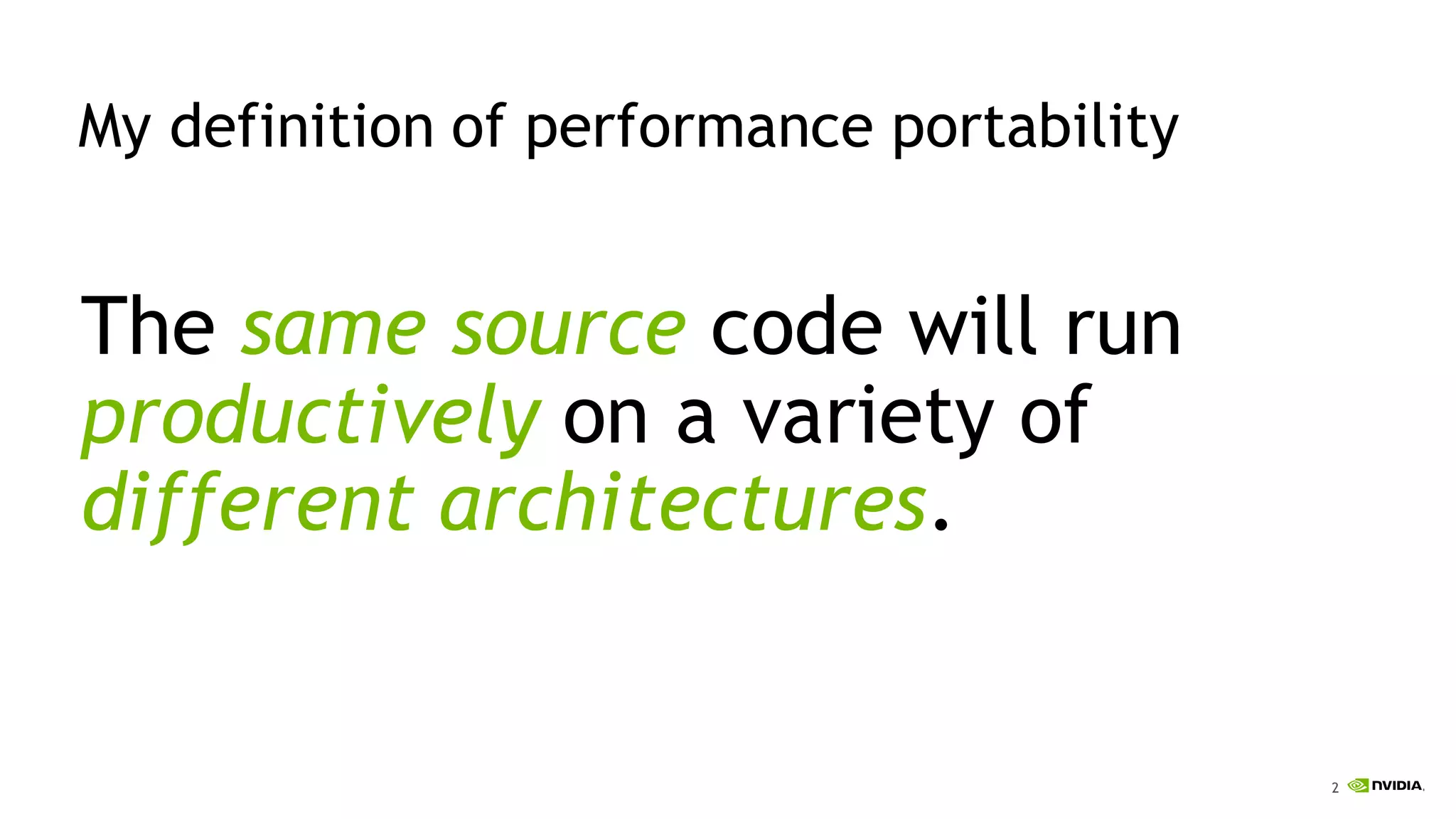
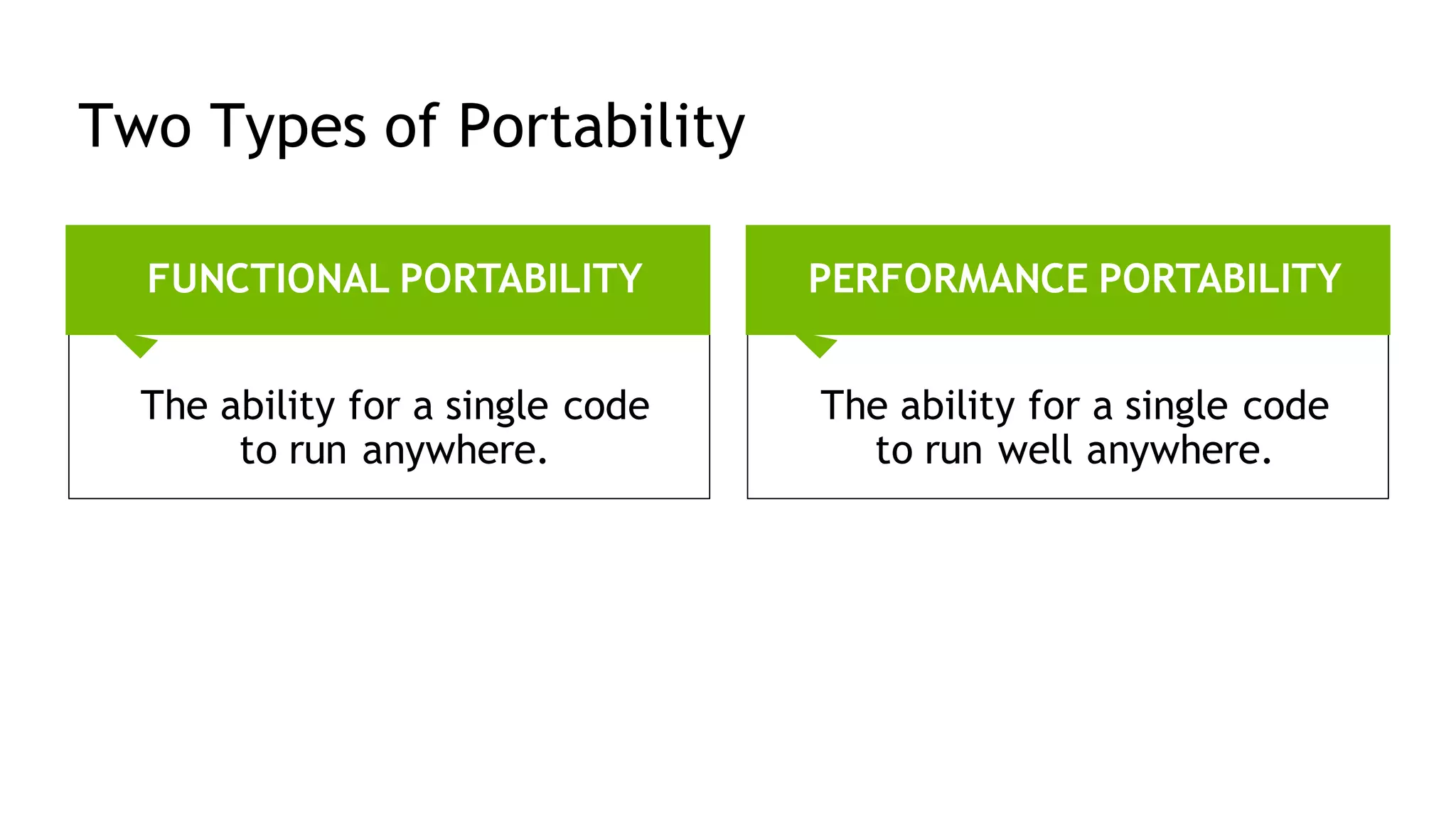


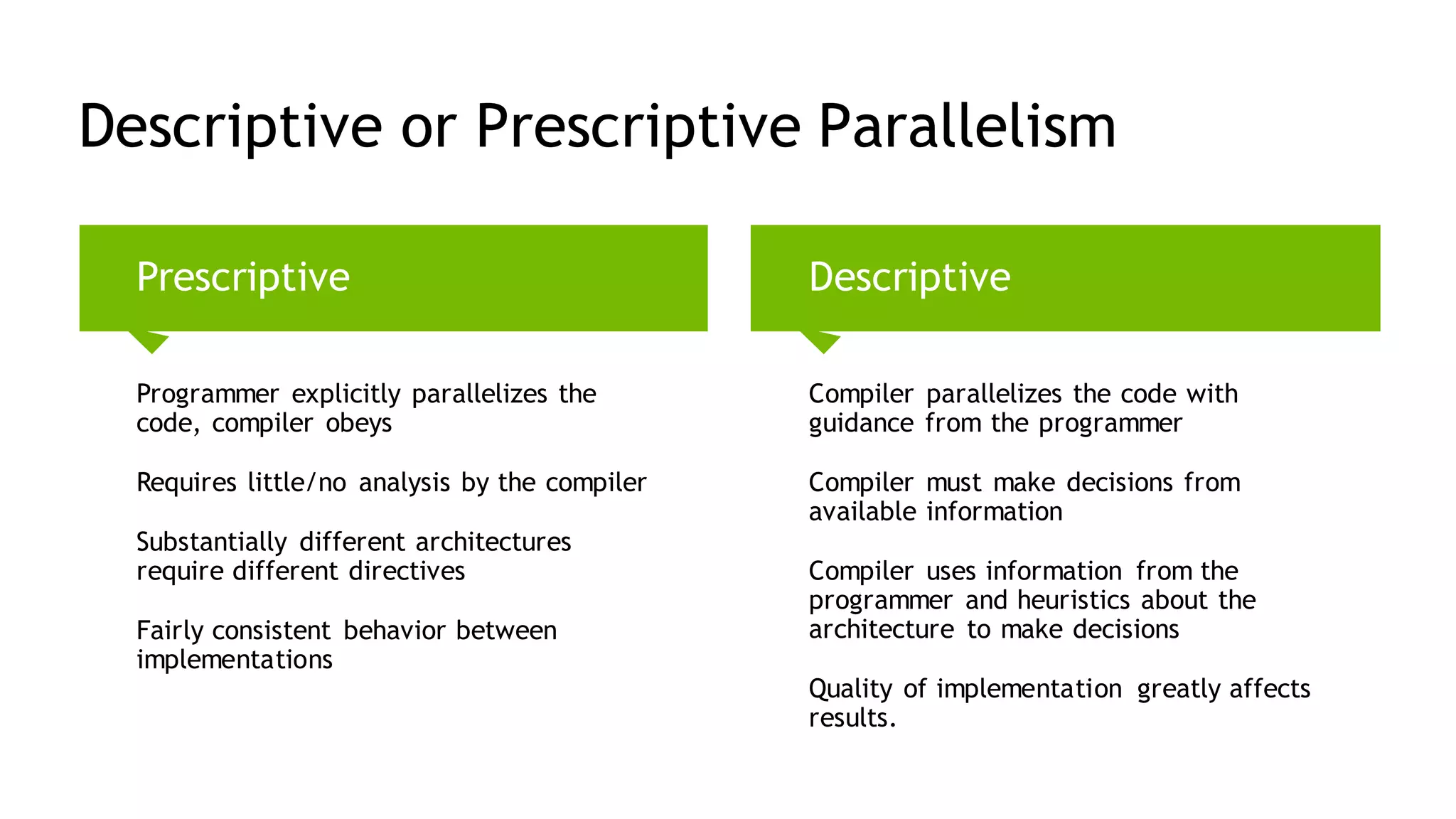
![7
Prescribing vs. Describing
while ( error > tol && iter < iter_max )
{
error = 0.0;
#pragma omp parallel for reduction(max:error)
for( int j = 1; j < n-1; j++) {
#pragma omp simd
for( int i = 1; i < m-1; i++ ) {
Anew[j][i] = 0.25 * ( A[j][i+1] + A[j][i-1]
+ A[j-1][i] + A[j+1][i]);
error = fmax( error, fabs(Anew[j][i] - A[j][i]));
}
}
#pragma omp parallel for
for( int j = 1; j < n-1; j++) {
#pragma omp simd
for( int i = 1; i < m-1; i++ ) {
A[j][i] = Anew[j][i];
}
}
if(iter++ % 100 == 0) printf("%5d, %0.6fn", iter, error);
}
while ( error > tol && iter < iter_max )
{
error = 0.0;
#pragma acc parallel loop reduction(max:error)
for( int j = 1; j < n-1; j++) {
#pragma acc loop reduction(max:error)
for( int i = 1; i < m-1; i++ ) {
Anew[j][i] = 0.25 * ( A[j][i+1] + A[j][i-1]
+ A[j-1][i] + A[j+1][i]);
error = fmax( error, fabs(Anew[j][i] - A[j][i]));
}
}
#pragma acc parallel loop
for( int j = 1; j < n-1; j++) {
#pragma acc loop
for( int i = 1; i < m-1; i++ ) {
A[j][i] = Anew[j][i];
}
}
if(iter++ % 100 == 0) printf("%5d, %0.6fn", iter, error);
}](https://image.slidesharecdn.com/larkindoeportabilityworkshop-160421230747/75/Performance-Portability-Through-Descriptive-Parallelism-7-2048.jpg)
![8
Prescribing vs. Describing
while ( error > tol && iter < iter_max )
{
error = 0.0;
#pragma omp parallel for reduction(max:error)
for( int j = 1; j < n-1; j++) {
#pragma omp simd
for( int i = 1; i < m-1; i++ ) {
Anew[j][i] = 0.25 * ( A[j][i+1] + A[j][i-1]
+ A[j-1][i] + A[j+1][i]);
error = fmax( error, fabs(Anew[j][i] - A[j][i]));
}
}
#pragma omp parallel for
for( int j = 1; j < n-1; j++) {
#pragma omp simd
for( int i = 1; i < m-1; i++ ) {
A[j][i] = Anew[j][i];
}
}
if(iter++ % 100 == 0) printf("%5d, %0.6fn", iter, error);
}
while ( error > tol && iter < iter_max )
{
error = 0.0;
#pragma acc parallel loop reduction(max:error)
for( int j = 1; j < n-1; j++) {
#pragma acc loop reduction(max:error)
for( int i = 1; i < m-1; i++ ) {
Anew[j][i] = 0.25 * ( A[j][i+1] + A[j][i-1]
+ A[j-1][i] + A[j+1][i]);
error = fmax( error, fabs(Anew[j][i] - A[j][i]));
}
}
#pragma acc parallel loop
for( int j = 1; j < n-1; j++) {
#pragma acc loop
for( int i = 1; i < m-1; i++ ) {
A[j][i] = Anew[j][i];
}
}
if(iter++ % 100 == 0) printf("%5d, %0.6fn", iter, error);
}
while ( error > tol && iter < iter_max )
{
error = 0.0;
#pragma omp target
{
#pragma omp parallel for reduction(max:error)
for( int j = 1; j < n-1; j++) {
for( int i = 1; i < m-1; i++ ) {
Anew[j][i] = 0.25 * ( A[j][i+1] + A[j][i-1]
+ A[j-1][i] + A[j+1][i]);
error = fmax( error, fabs(Anew[j][i] - A[j][i]));
}
}
#pragma omp parallel for
for( int j = 1; j < n-1; j++) {
for( int i = 1; i < m-1; i++ ) {
A[j][i] = Anew[j][i];
}
}
}
if(iter++ % 100 == 0) printf("%5d, %0.6fn", iter, error);
}](https://image.slidesharecdn.com/larkindoeportabilityworkshop-160421230747/75/Performance-Portability-Through-Descriptive-Parallelism-8-2048.jpg)
![9
Prescribing vs. Describing
while ( error > tol && iter < iter_max )
{
error = 0.0;
#pragma omp parallel for reduction(max:error)
for( int j = 1; j < n-1; j++) {
#pragma omp simd
for( int i = 1; i < m-1; i++ ) {
Anew[j][i] = 0.25 * ( A[j][i+1] + A[j][i-1]
+ A[j-1][i] + A[j+1][i]);
error = fmax( error, fabs(Anew[j][i] - A[j][i]));
}
}
#pragma omp parallel for
for( int j = 1; j < n-1; j++) {
#pragma omp simd
for( int i = 1; i < m-1; i++ ) {
A[j][i] = Anew[j][i];
}
}
if(iter++ % 100 == 0) printf("%5d, %0.6fn", iter, error);
}
while ( error > tol && iter < iter_max )
{
error = 0.0;
#pragma acc parallel loop reduction(max:error)
for( int j = 1; j < n-1; j++) {
#pragma acc loop reduction(max:error)
for( int i = 1; i < m-1; i++ ) {
Anew[j][i] = 0.25 * ( A[j][i+1] + A[j][i-1]
+ A[j-1][i] + A[j+1][i]);
error = fmax( error, fabs(Anew[j][i] - A[j][i]));
}
}
#pragma acc parallel loop
for( int j = 1; j < n-1; j++) {
#pragma acc loop
for( int i = 1; i < m-1; i++ ) {
A[j][i] = Anew[j][i];
}
}
if(iter++ % 100 == 0) printf("%5d, %0.6fn", iter, error);
}
while ( error > tol && iter < iter_max )
{
error = 0.0;
#pragma omp target
{
#pragma omp parallel for reduction(max:error)
for( int j = 1; j < n-1; j++) {
for( int i = 1; i < m-1; i++ ) {
Anew[j][i] = 0.25 * ( A[j][i+1] + A[j][i-1]
+ A[j-1][i] + A[j+1][i]);
error = fmax( error, fabs(Anew[j][i] - A[j][i]));
}
}
#pragma omp parallel for
for( int j = 1; j < n-1; j++) {
for( int i = 1; i < m-1; i++ ) {
A[j][i] = Anew[j][i];
}
}
}
if(iter++ % 100 == 0) printf("%5d, %0.6fn", iter, error);
}
#pragma omp target data map(alloc:Anew) map(A)
while ( error > tol && iter < iter_max )
{
error = 0.0;
#pragma omp target teams distribute parallel for
reduction(max:error)
for( int j = 1; j < n-1; j++)
{
for( int i = 1; i < m-1; i++ )
{
Anew[j][i] = 0.25 * ( A[j][i+1] + A[j][i-1]
+ A[j-1][i] + A[j+1][i]);
error = fmax( error, fabs(Anew[j][i] - A[j][i]));
}
}
#pragma omp target teams distribute parallel for
for( int j = 1; j < n-1; j++)
{
for( int i = 1; i < m-1; i++ )
{
A[j][i] = Anew[j][i];
}
}](https://image.slidesharecdn.com/larkindoeportabilityworkshop-160421230747/75/Performance-Portability-Through-Descriptive-Parallelism-9-2048.jpg)
![10
Prescribing vs. Describing
while ( error > tol && iter < iter_max )
{
error = 0.0;
#pragma omp parallel for reduction(max:error)
for( int j = 1; j < n-1; j++) {
#pragma omp simd
for( int i = 1; i < m-1; i++ ) {
Anew[j][i] = 0.25 * ( A[j][i+1] + A[j][i-1]
+ A[j-1][i] + A[j+1][i]);
error = fmax( error, fabs(Anew[j][i] - A[j][i]));
}
}
#pragma omp parallel for
for( int j = 1; j < n-1; j++) {
#pragma omp simd
for( int i = 1; i < m-1; i++ ) {
A[j][i] = Anew[j][i];
}
}
if(iter++ % 100 == 0) printf("%5d, %0.6fn", iter, error);
}
while ( error > tol && iter < iter_max )
{
error = 0.0;
#pragma acc parallel loop reduction(max:error)
for( int j = 1; j < n-1; j++) {
#pragma acc loop reduction(max:error)
for( int i = 1; i < m-1; i++ ) {
Anew[j][i] = 0.25 * ( A[j][i+1] + A[j][i-1]
+ A[j-1][i] + A[j+1][i]);
error = fmax( error, fabs(Anew[j][i] - A[j][i]));
}
}
#pragma acc parallel loop
for( int j = 1; j < n-1; j++) {
#pragma acc loop
for( int i = 1; i < m-1; i++ ) {
A[j][i] = Anew[j][i];
}
}
if(iter++ % 100 == 0) printf("%5d, %0.6fn", iter, error);
}
while ( error > tol && iter < iter_max )
{
error = 0.0;
#pragma omp target
{
#pragma omp parallel for reduction(max:error)
for( int j = 1; j < n-1; j++) {
for( int i = 1; i < m-1; i++ ) {
Anew[j][i] = 0.25 * ( A[j][i+1] + A[j][i-1]
+ A[j-1][i] + A[j+1][i]);
error = fmax( error, fabs(Anew[j][i] - A[j][i]));
}
}
#pragma omp parallel for
for( int j = 1; j < n-1; j++) {
for( int i = 1; i < m-1; i++ ) {
A[j][i] = Anew[j][i];
}
}
}
if(iter++ % 100 == 0) printf("%5d, %0.6fn", iter, error);
}
#pragma omp target data map(alloc:Anew) map(A)
while ( error > tol && iter < iter_max )
{
error = 0.0;
#pragma omp target teams distribute parallel for
reduction(max:error)
for( int j = 1; j < n-1; j++)
{
for( int i = 1; i < m-1; i++ )
{
Anew[j][i] = 0.25 * ( A[j][i+1] + A[j][i-1]
+ A[j-1][i] + A[j+1][i]);
error = fmax( error, fabs(Anew[j][i] - A[j][i]));
}
}
#pragma omp target teams distribute parallel for
for( int j = 1; j < n-1; j++)
{
for( int i = 1; i < m-1; i++ )
{
A[j][i] = Anew[j][i];
}
}
#pragma omp target data map(alloc:Anew) map(A)
while ( error > tol && iter < iter_max )
{
error = 0.0;
#pragma omp target teams distribute parallel for
reduction(max:error)
for( int j = 1; j < n-1; j++)
{
for( int i = 1; i < m-1; i++ )
{
Anew[j][i] = 0.25 * ( A[j][i+1] + A[j][i-1]
+ A[j-1][i] + A[j+1][i]);
error = fmax( error, fabs(Anew[j][i] - A[j][i]));
}
}
#pragma omp target teams distribute parallel for
for( int j = 1; j < n-1; j++)
{
for( int i = 1; i < m-1; i++ )
{
A[j][i] = Anew[j][i];
}
#pragma omp target data map(alloc:Anew) map(A)
while ( error > tol && iter < iter_max )
{
error = 0.0;
#pragma omp target teams distribute
for( int j = 1; j < n-1; j++)
{
#pragma omp parallel for reduction(max:error) schedule(static,1)
for( int i = 1; i < m-1; i++ )
{
Anew[j][i] = 0.25 * ( A[j][i+1] + A[j][i-1]
+ A[j-1][i] + A[j+1][i]);
error = fmax( error, fabs(Anew[j][i] - A[j][i]));
}
}
#pragma omp target teams distribute
for( int j = 1; j < n-1; j++)
{
#pragma omp parallel for schedule(static,1)
for( int i = 1; i < m-1; i++ )
{](https://image.slidesharecdn.com/larkindoeportabilityworkshop-160421230747/75/Performance-Portability-Through-Descriptive-Parallelism-10-2048.jpg)
![11
Prescribing vs. Describing
while ( error > tol && iter < iter_max )
{
error = 0.0;
#pragma omp parallel for reduction(max:error)
for( int j = 1; j < n-1; j++) {
#pragma omp simd
for( int i = 1; i < m-1; i++ ) {
Anew[j][i] = 0.25 * ( A[j][i+1] + A[j][i-1]
+ A[j-1][i] + A[j+1][i]);
error = fmax( error, fabs(Anew[j][i] - A[j][i]));
}
}
#pragma omp parallel for
for( int j = 1; j < n-1; j++) {
#pragma omp simd
for( int i = 1; i < m-1; i++ ) {
A[j][i] = Anew[j][i];
}
}
if(iter++ % 100 == 0) printf("%5d, %0.6fn", iter, error);
}
while ( error > tol && iter < iter_max )
{
error = 0.0;
#pragma acc parallel loop reduction(max:error)
for( int j = 1; j < n-1; j++) {
#pragma acc loop reduction(max:error)
for( int i = 1; i < m-1; i++ ) {
Anew[j][i] = 0.25 * ( A[j][i+1] + A[j][i-1]
+ A[j-1][i] + A[j+1][i]);
error = fmax( error, fabs(Anew[j][i] - A[j][i]));
}
}
#pragma acc parallel loop
for( int j = 1; j < n-1; j++) {
#pragma acc loop
for( int i = 1; i < m-1; i++ ) {
A[j][i] = Anew[j][i];
}
}
if(iter++ % 100 == 0) printf("%5d, %0.6fn", iter, error);
}
while ( error > tol && iter < iter_max )
{
error = 0.0;
#pragma omp target
{
#pragma omp parallel for reduction(max:error)
for( int j = 1; j < n-1; j++) {
for( int i = 1; i < m-1; i++ ) {
Anew[j][i] = 0.25 * ( A[j][i+1] + A[j][i-1]
+ A[j-1][i] + A[j+1][i]);
error = fmax( error, fabs(Anew[j][i] - A[j][i]));
}
}
#pragma omp parallel for
for( int j = 1; j < n-1; j++) {
for( int i = 1; i < m-1; i++ ) {
A[j][i] = Anew[j][i];
}
}
}
if(iter++ % 100 == 0) printf("%5d, %0.6fn", iter, error);
}
#pragma omp target data map(alloc:Anew) map(A)
while ( error > tol && iter < iter_max )
{
error = 0.0;
#pragma omp target teams distribute parallel for
reduction(max:error)
for( int j = 1; j < n-1; j++)
{
for( int i = 1; i < m-1; i++ )
{
Anew[j][i] = 0.25 * ( A[j][i+1] + A[j][i-1]
+ A[j-1][i] + A[j+1][i]);
error = fmax( error, fabs(Anew[j][i] - A[j][i]));
}
}
#pragma omp target teams distribute parallel for
for( int j = 1; j < n-1; j++)
{
for( int i = 1; i < m-1; i++ )
{
A[j][i] = Anew[j][i];
}
}
#pragma omp target data map(alloc:Anew) map(A)
while ( error > tol && iter < iter_max )
{
error = 0.0;
#pragma omp target teams distribute parallel for
reduction(max:error)
for( int j = 1; j < n-1; j++)
{
for( int i = 1; i < m-1; i++ )
{
Anew[j][i] = 0.25 * ( A[j][i+1] + A[j][i-1]
+ A[j-1][i] + A[j+1][i]);
error = fmax( error, fabs(Anew[j][i] - A[j][i]));
}
}
#pragma omp target teams distribute parallel for
for( int j = 1; j < n-1; j++)
{
for( int i = 1; i < m-1; i++ )
{
A[j][i] = Anew[j][i];
}
#pragma omp target data map(alloc:Anew) map(A)
while ( error > tol && iter < iter_max )
{
error = 0.0;
#pragma omp target teams distribute
for( int j = 1; j < n-1; j++)
{
#pragma omp parallel for reduction(max:error) schedule(static,1)
for( int i = 1; i < m-1; i++ )
{
Anew[j][i] = 0.25 * ( A[j][i+1] + A[j][i-1]
+ A[j-1][i] + A[j+1][i]);
error = fmax( error, fabs(Anew[j][i] - A[j][i]));
}
}
#pragma omp target teams distribute
for( int j = 1; j < n-1; j++)
{
#pragma omp parallel for schedule(static,1)
for( int i = 1; i < m-1; i++ )
{
#pragma omp target data map(alloc:Anew) map(A)
while ( error > tol && iter < iter_max )
{
error = 0.0;
#pragma omp target teams distribute parallel for
reduction(max:error) collapse(2)
for( int j = 1; j < n-1; j++)
{
for( int i = 1; i < m-1; i++ )
{
Anew[j][i] = 0.25 * ( A[j][i+1] + A[j][i-1]
+ A[j-1][i] + A[j+1][i]);
error = fmax( error, fabs(Anew[j][i] - A[j][i]));
}
}
#pragma omp target teams distribute parallel for
collapse(2)
for( int j = 1; j < n-1; j++)
{](https://image.slidesharecdn.com/larkindoeportabilityworkshop-160421230747/75/Performance-Portability-Through-Descriptive-Parallelism-11-2048.jpg)
![12
Prescribing vs. Describing
while ( error > tol && iter < iter_max )
{
error = 0.0;
#pragma omp parallel for reduction(max:error)
for( int j = 1; j < n-1; j++) {
#pragma omp simd
for( int i = 1; i < m-1; i++ ) {
Anew[j][i] = 0.25 * ( A[j][i+1] + A[j][i-1]
+ A[j-1][i] + A[j+1][i]);
error = fmax( error, fabs(Anew[j][i] - A[j][i]));
}
}
#pragma omp parallel for
for( int j = 1; j < n-1; j++) {
#pragma omp simd
for( int i = 1; i < m-1; i++ ) {
A[j][i] = Anew[j][i];
}
}
if(iter++ % 100 == 0) printf("%5d, %0.6fn", iter, error);
}
while ( error > tol && iter < iter_max )
{
error = 0.0;
#pragma acc parallel loop reduction(max:error)
for( int j = 1; j < n-1; j++) {
#pragma acc loop reduction(max:error)
for( int i = 1; i < m-1; i++ ) {
Anew[j][i] = 0.25 * ( A[j][i+1] + A[j][i-1]
+ A[j-1][i] + A[j+1][i]);
error = fmax( error, fabs(Anew[j][i] - A[j][i]));
}
}
#pragma acc parallel loop
for( int j = 1; j < n-1; j++) {
#pragma acc loop
for( int i = 1; i < m-1; i++ ) {
A[j][i] = Anew[j][i];
}
}
if(iter++ % 100 == 0) printf("%5d, %0.6fn", iter, error);
}
while ( error > tol && iter < iter_max )
{
error = 0.0;
#pragma omp target
{
#pragma omp parallel for reduction(max:error)
for( int j = 1; j < n-1; j++) {
for( int i = 1; i < m-1; i++ ) {
Anew[j][i] = 0.25 * ( A[j][i+1] + A[j][i-1]
+ A[j-1][i] + A[j+1][i]);
error = fmax( error, fabs(Anew[j][i] - A[j][i]));
}
}
#pragma omp parallel for
for( int j = 1; j < n-1; j++) {
for( int i = 1; i < m-1; i++ ) {
A[j][i] = Anew[j][i];
}
}
}
if(iter++ % 100 == 0) printf("%5d, %0.6fn", iter, error);
}
#pragma omp target data map(alloc:Anew) map(A)
while ( error > tol && iter < iter_max )
{
error = 0.0;
#pragma omp target teams distribute parallel for
reduction(max:error)
for( int j = 1; j < n-1; j++)
{
for( int i = 1; i < m-1; i++ )
{
Anew[j][i] = 0.25 * ( A[j][i+1] + A[j][i-1]
+ A[j-1][i] + A[j+1][i]);
error = fmax( error, fabs(Anew[j][i] - A[j][i]));
}
}
#pragma omp target teams distribute parallel for
for( int j = 1; j < n-1; j++)
{
for( int i = 1; i < m-1; i++ )
{
A[j][i] = Anew[j][i];
}
}
#pragma omp target data map(alloc:Anew) map(A)
while ( error > tol && iter < iter_max )
{
error = 0.0;
#pragma omp target teams distribute parallel for
reduction(max:error)
for( int j = 1; j < n-1; j++)
{
for( int i = 1; i < m-1; i++ )
{
Anew[j][i] = 0.25 * ( A[j][i+1] + A[j][i-1]
+ A[j-1][i] + A[j+1][i]);
error = fmax( error, fabs(Anew[j][i] - A[j][i]));
}
}
#pragma omp target teams distribute parallel for
for( int j = 1; j < n-1; j++)
{
for( int i = 1; i < m-1; i++ )
{
A[j][i] = Anew[j][i];
}
#pragma omp target data map(alloc:Anew) map(A)
while ( error > tol && iter < iter_max )
{
error = 0.0;
#pragma omp target teams distribute
for( int j = 1; j < n-1; j++)
{
#pragma omp parallel for reduction(max:error) schedule(static,1)
for( int i = 1; i < m-1; i++ )
{
Anew[j][i] = 0.25 * ( A[j][i+1] + A[j][i-1]
+ A[j-1][i] + A[j+1][i]);
error = fmax( error, fabs(Anew[j][i] - A[j][i]));
}
}
#pragma omp target teams distribute
for( int j = 1; j < n-1; j++)
{
#pragma omp parallel for schedule(static,1)
for( int i = 1; i < m-1; i++ )
{
#pragma omp target data map(alloc:Anew) map(A)
while ( error > tol && iter < iter_max )
{
error = 0.0;
#pragma omp target teams distribute
for( int j = 1; j < n-1; j++)
{
#pragma omp parallel for reduction(max:error) schedule(static,1)
for( int i = 1; i < m-1; i++ )
{
Anew[j][i] = 0.25 * ( A[j][i+1] + A[j][i-1]
+ A[j-1][i] + A[j+1][i]);
error = fmax( error, fabs(Anew[j][i] - A[j][i]));
}
}
#pragma omp target teams distribute
for( int j = 1; j < n-1; j++)
{
#pragma omp parallel for schedule(static,1)](https://image.slidesharecdn.com/larkindoeportabilityworkshop-160421230747/75/Performance-Portability-Through-Descriptive-Parallelism-12-2048.jpg)
![13
Prescribing vs. Describing
while ( error > tol && iter < iter_max )
{
error = 0.0;
#pragma omp parallel for reduction(max:error)
for( int j = 1; j < n-1; j++) {
#pragma omp simd
for( int i = 1; i < m-1; i++ ) {
Anew[j][i] = 0.25 * ( A[j][i+1] + A[j][i-1]
+ A[j-1][i] + A[j+1][i]);
error = fmax( error, fabs(Anew[j][i] - A[j][i]));
}
}
#pragma omp parallel for
for( int j = 1; j < n-1; j++) {
#pragma omp simd
for( int i = 1; i < m-1; i++ ) {
A[j][i] = Anew[j][i];
}
}
if(iter++ % 100 == 0) printf("%5d, %0.6fn", iter, error);
}
while ( error > tol && iter < iter_max )
{
error = 0.0;
#pragma acc parallel loop reduction(max:error)
for( int j = 1; j < n-1; j++) {
#pragma acc loop reduction(max:error)
for( int i = 1; i < m-1; i++ ) {
Anew[j][i] = 0.25 * ( A[j][i+1] + A[j][i-1]
+ A[j-1][i] + A[j+1][i]);
error = fmax( error, fabs(Anew[j][i] - A[j][i]));
}
}
#pragma acc parallel loop
for( int j = 1; j < n-1; j++) {
#pragma acc loop
for( int i = 1; i < m-1; i++ ) {
A[j][i] = Anew[j][i];
}
}
if(iter++ % 100 == 0) printf("%5d, %0.6fn", iter, error);
}
while ( error > tol && iter < iter_max )
{
error = 0.0;
#pragma omp target
{
#pragma omp parallel for reduction(max:error)
for( int j = 1; j < n-1; j++) {
for( int i = 1; i < m-1; i++ ) {
Anew[j][i] = 0.25 * ( A[j][i+1] + A[j][i-1]
+ A[j-1][i] + A[j+1][i]);
error = fmax( error, fabs(Anew[j][i] - A[j][i]));
}
}
#pragma omp parallel for
for( int j = 1; j < n-1; j++) {
for( int i = 1; i < m-1; i++ ) {
A[j][i] = Anew[j][i];
}
}
}
if(iter++ % 100 == 0) printf("%5d, %0.6fn", iter, error);
}
#pragma omp target data map(alloc:Anew) map(A)
while ( error > tol && iter < iter_max )
{
error = 0.0;
#pragma omp target teams distribute parallel for
reduction(max:error)
for( int j = 1; j < n-1; j++)
{
for( int i = 1; i < m-1; i++ )
{
Anew[j][i] = 0.25 * ( A[j][i+1] + A[j][i-1]
+ A[j-1][i] + A[j+1][i]);
error = fmax( error, fabs(Anew[j][i] - A[j][i]));
}
}
#pragma omp target teams distribute parallel for
for( int j = 1; j < n-1; j++)
{
for( int i = 1; i < m-1; i++ )
{
A[j][i] = Anew[j][i];
}
}
#pragma omp target data map(alloc:Anew) map(A)
while ( error > tol && iter < iter_max )
{
error = 0.0;
#pragma omp target teams distribute parallel for
reduction(max:error)
for( int j = 1; j < n-1; j++)
{
for( int i = 1; i < m-1; i++ )
{
Anew[j][i] = 0.25 * ( A[j][i+1] + A[j][i-1]
+ A[j-1][i] + A[j+1][i]);
error = fmax( error, fabs(Anew[j][i] - A[j][i]));
}
}
#pragma omp target teams distribute parallel for
for( int j = 1; j < n-1; j++)
{
for( int i = 1; i < m-1; i++ )
{
A[j][i] = Anew[j][i];
}
#pragma omp target data map(alloc:Anew) map(A)
while ( error > tol && iter < iter_max )
{
error = 0.0;
#pragma omp target teams distribute
for( int j = 1; j < n-1; j++)
{
#pragma omp parallel for reduction(max:error) schedule(static,1)
for( int i = 1; i < m-1; i++ )
{
Anew[j][i] = 0.25 * ( A[j][i+1] + A[j][i-1]
+ A[j-1][i] + A[j+1][i]);
error = fmax( error, fabs(Anew[j][i] - A[j][i]));
}
}
#pragma omp target teams distribute
for( int j = 1; j < n-1; j++)
{
#pragma omp parallel for schedule(static,1)
for( int i = 1; i < m-1; i++ )
{
#pragma omp target data map(alloc:Anew) map(A)
while ( error > tol && iter < iter_max )
{
error = 0.0;
#pragma omp target teams distribute
for( int j = 1; j < n-1; j++)
{
#pragma omp parallel for reduction(max:error) schedule(static,1)
for( int i = 1; i < m-1; i++ )
{
Anew[j][i] = 0.25 * ( A[j][i+1] + A[j][i-1]
+ A[j-1][i] + A[j+1][i]);
error = fmax( error, fabs(Anew[j][i] - A[j][i]));
}
}
#pragma omp target teams distribute
for( int j = 1; j < n-1; j++)
{
#pragma omp parallel for schedule(static,1)
#pragma omp target data map(alloc:Anew) map(A)
while ( error > tol && iter < iter_max )
{
error = 0.0;
#pragma omp target teams distribute parallel for
reduction(max:error) collapse(2) schedule(static,1)
for( int j = 1; j < n-1; j++)
{
for( int i = 1; i < m-1; i++ )
{
Anew[j][i] = 0.25 * ( A[j][i+1] + A[j][i-1]
+ A[j-1][i] + A[j+1][i]);
error = fmax( error, fabs(Anew[j][i] - A[j][i]));
}
}
#pragma omp target teams distribute parallel for
collapse(2) schedule(static,1)](https://image.slidesharecdn.com/larkindoeportabilityworkshop-160421230747/75/Performance-Portability-Through-Descriptive-Parallelism-13-2048.jpg)
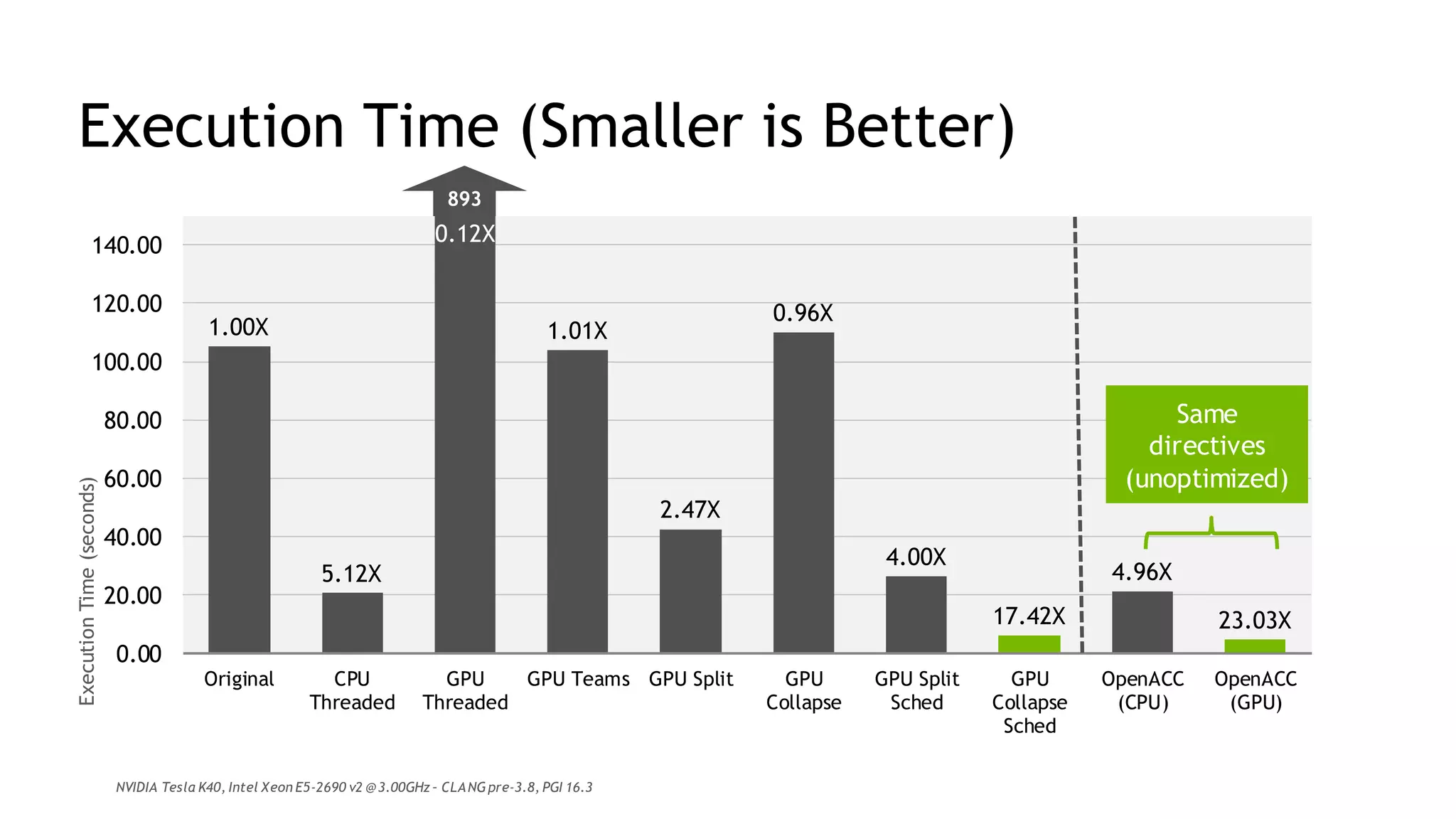
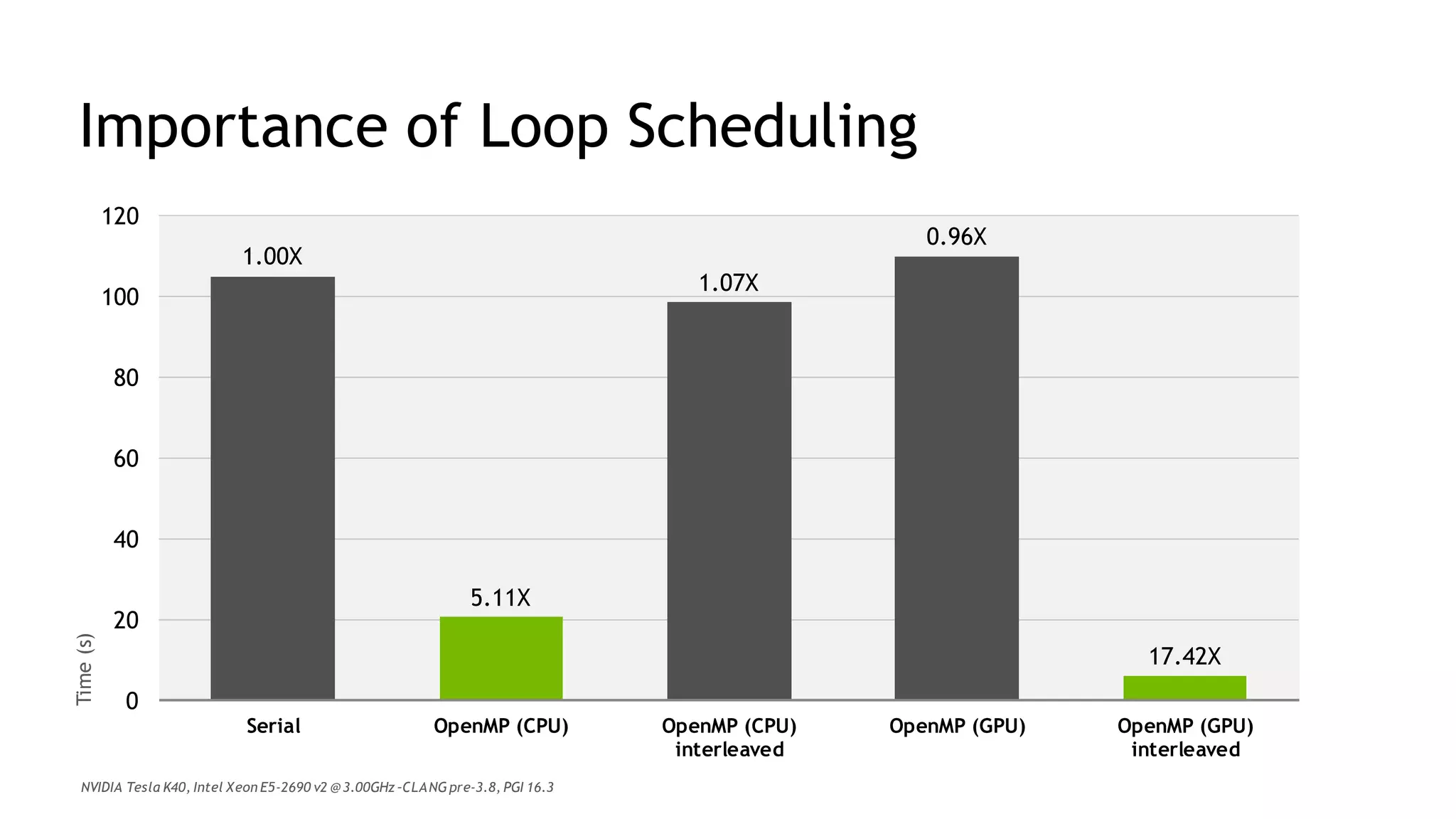
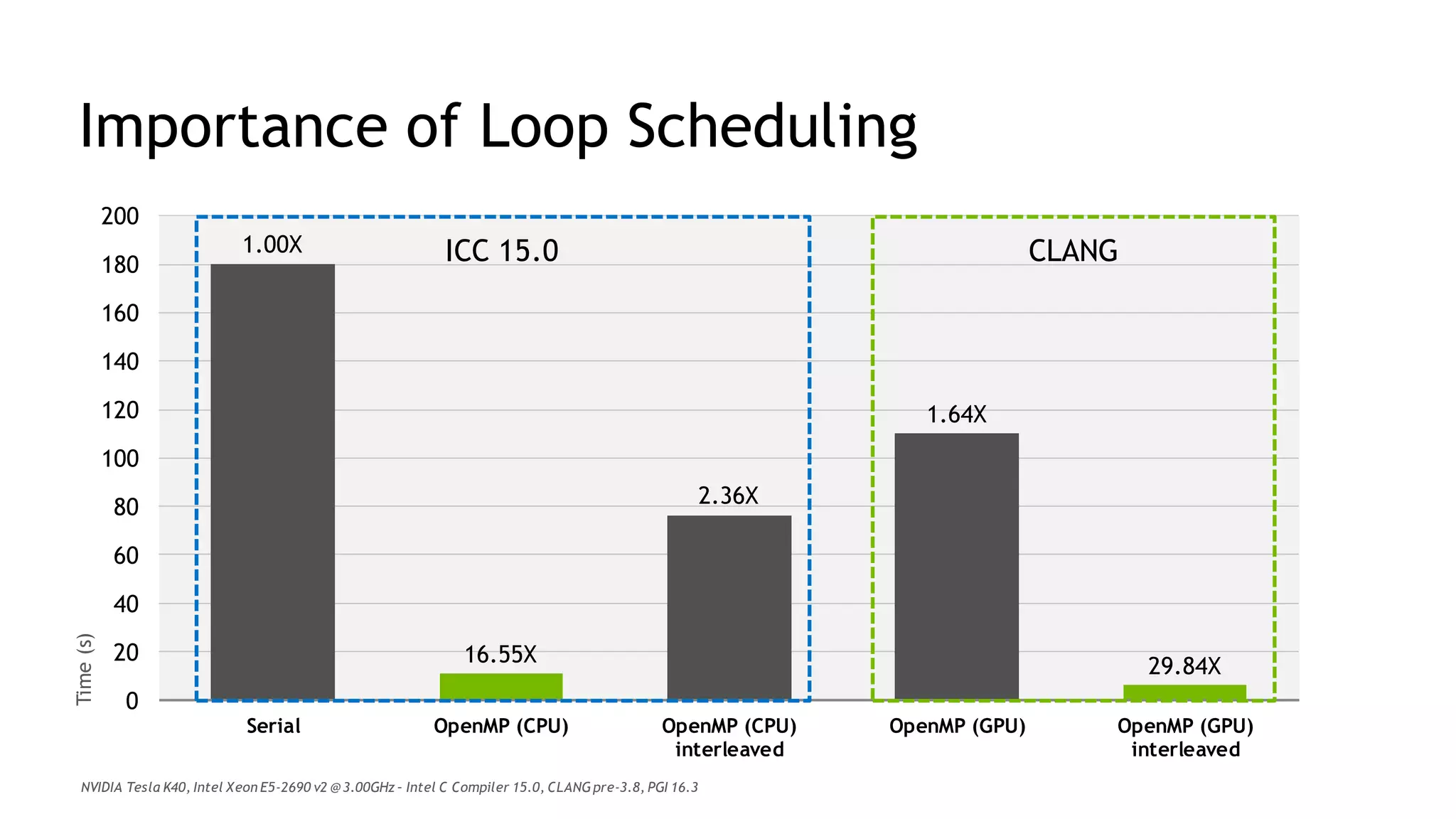
![17
Why Can’t OpenMP Do This? (1)
#pragma omp target teams distribute parallel for
reduction(max:error) collapse(2) schedule(static,1)
for( int j = 1; j < n-1; j++)
{
for( int i = 1; i < m-1; i++ )
{
Anew[j][i] = 0.25 * ( A[j][i+1] + A[j][i-1]
+ A[j-1][i] + A[j+1][i]);
error = fmax( error, fabs(Anew[j][i] - A[j][i]));
}
}
#pragma omp target teams distribute parallel for
collapse(2) schedule(static,1)
for( int j = 1; j < n-1; j++)
{
for( int i = 1; i < m-1; i++ )
{
A[j][i] = Anew[j][i];
}
}
The compiler can freely specify
the default schedule, but not
add the collapse
Wrong loop for coalescing on the
GPU
Default schedule is implementation defined](https://image.slidesharecdn.com/larkindoeportabilityworkshop-160421230747/75/Performance-Portability-Through-Descriptive-Parallelism-17-2048.jpg)
![18
Why Can’t OpenMP Do This? (2)
#pragma omp target teams distribute
for( int j = 1; j < n-1; j++)
{
#pragma omp parallel for reduction(max:error) schedule(static,1)
for( int i = 1; i < m-1; i++ )
{
Anew[j][i] = 0.25 * ( A[j][i+1] + A[j][i-1]
+ A[j-1][i] + A[j+1][i]);
error = fmax( error, fabs(Anew[j][i] - A[j][i]));
}
}
#pragma omp target teams distribute
for( int j = 1; j < n-1; j++)
{
#pragma omp parallel for schedule(static,1)
for( int i = 1; i < m-1; i++ )
{
A[j][i] = Anew[j][i];
}
}
Right loop for coalescing on the
GPU
Makes no sense to distribute to
teams on the CPU
Default schedule is implementation defined](https://image.slidesharecdn.com/larkindoeportabilityworkshop-160421230747/75/Performance-Portability-Through-Descriptive-Parallelism-18-2048.jpg)
![19
Why Can’t OpenMP Do This? (3)
#pragma omp target teams distribute parallel for
reduction(max:error) collapse(2) simd
for( int j = 1; j < n-1; j++)
{
for( int i = 1; i < m-1; i++ )
{
Anew[j][i] = 0.25 * ( A[j][i+1] + A[j][i-1]
+ A[j-1][i] + A[j+1][i]);
error = fmax( error, fabs(Anew[j][i] - A[j][i]));
}
}
#pragma omp target teams distribute parallel for collapse(2) simd
for( int j = 1; j < n-1; j++)
{
for( int i = 1; i < m-1; i++ )
{
A[j][i] = Anew[j][i];
}
}
Compile can always choose 1
team, making this behave as a
parallel for
Maybe the compiler can treat
SIMD as a coalescing hint?
Is this the new best practice?
Default schedule is implementation defined](https://image.slidesharecdn.com/larkindoeportabilityworkshop-160421230747/75/Performance-Portability-Through-Descriptive-Parallelism-19-2048.jpg)
